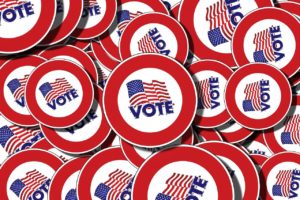Virginians are nearly evenly divided in their preferences for the upcoming legislative elections, with 40 percent favoring Democratic Party majorities in the House of Delegates and the Senate of Virginia next year, while 37 percent said they wanted Republican legislative majorities, according to a new statewide survey from the Center for Leadership and Media Studies at the University of Mary Washington. Among the subset of likely voters, 42 percent said they would like to see the Democrats in charge and 42 percent said they favor Republican control.

A new poll conducted for the University of Mary Washington’s Center for Leadership and Media Studies surveyed Virginians’ concerns ahead of midterm elections. Photo from Pixabay.The 1,000-person poll of Virginia adults (which includes 771 likely voters) was administered by Research America Inc. Sept. 5-11.
“Virginia has rapidly returned to its purple state status,” said Stephen J. Farnsworth, professor of political science at the University of Mary Washington and the Center’s director. “This new statewide survey shows that Virginia’s voters are basically evenly divided as they approach the upcoming Virginia legislative elections.”
Nearly two-thirds of survey respondents (64 percent) said Virginia public school policies would be a major factor in deciding their vote in the November legislative elections. Among Republicans, 65 percent said education policies would be a major factor. Among those who said they were Democrats, 64 percent said school policies would be a major factor in deciding their vote in the upcoming legislative elections. For independents, 64 percent said school policies would be a major factor.
The survey shows that last year’s Supreme Court decision to overturn Roe versus Wade would be a significant factor in the election as well, with 53 percent of those surveyed saying the abortion decision would be a major factor for them. Seventy percent of Democrats considered abortion a major factor for them in the upcoming elections, as compared to 35 percent of Republicans. Among independents, 54 percent said the abortion ruling was a major factor as they considered how to approach the Virginia midterms.
In the survey, 23 percent of respondents said abortion should be legal in all cases and 34 percent said it should be legal in most cases. Opposition to abortion is less common: 27 percent of the survey respondents said abortion should be illegal in most cases and 8 percent said it should be illegal in all cases. These figures are nearly unchanged from preferences expressed in the September 2022 survey.
Asked about the nation’s most important problem, 21 percent of Virginians identified threats to democracy, 20 percent said inflation, 16 percent said the economy and jobs, and 10 percent said immigration.
“Virginia midterm elections are at least partially a referendum on the incumbent governor, who has served nearly half a term at that point,” Farnsworth said.
In this new survey, 40 percent of Virginians said they approved of Glenn Youngkin’s job performance, as compared to 37 percent who disapproved. The remaining respondents were unsure. Among Republicans, 74 percent thought Youngkin was doing a good job, as compared to 36 percent of independents and 16 percent of Democrats.
Youngkin’s three-point net positive assessment was down from a 15-point net-positive assessment in the September 2022 survey. But Youngkin’s 2023 evaluation remains far better than survey respondents’ evaluations of President Biden, who had a net negative 17-point rating (35 percent expressing approval, 52 percent disapproval, with the rest unsure). Among Democrats, 72 percent thought Biden was doing a good job, as compared to 30 percent of independents, and 5 percent of Republicans thought the president was doing a good job.
“Expect each political party to continue to talk past the other,” Farnsworth said. “Republicans will focus on perceived threats to parental rights in education, while Democrats will talk about what Republicans will do to further restrict abortion if they secure legislative majorities in Richmond. The very close divisions among voter preferences in this survey demonstrate that both parties are largely evenly matched in Virginia right now.”
The Virginia statewide survey did not ask about specific legislative races, because the small sample size in each district would not provide reliable estimates of local voter preferences.
Survey Information:
The University of Mary Washington’s Fall 2023 Virginia Survey was conducted by Research America Inc. during September 5 – 11, 2023. The total sample included 1,000 Virginia residents, including 833 registered voters and 771 likely voters. Part of the sample (600) was contacted by phone (80 percent cell and 20 percent landline), and part of the sample (400) was contacted online. All interviews were in English. Statistical results are weighted to correct known demographic discrepancies, including age, gender and race/ethnicity. The margin of error on the total sample is +/- 3.0%. The margin of error on the Likely Voters portion of the sample is +/- 3.5%.
For further survey results, see Topline.
For further information or to schedule an interview, contact Professor Farnsworth at sfarnswo@umw.edu.